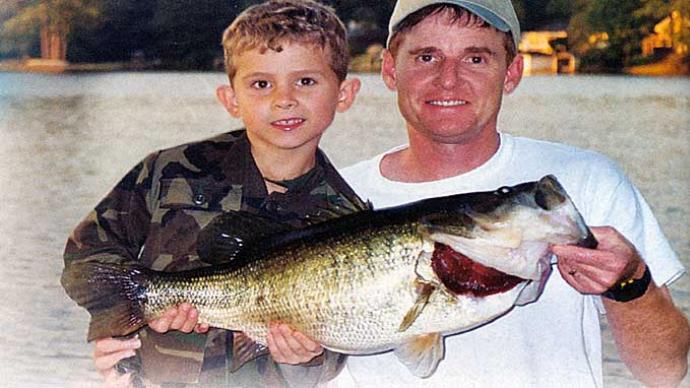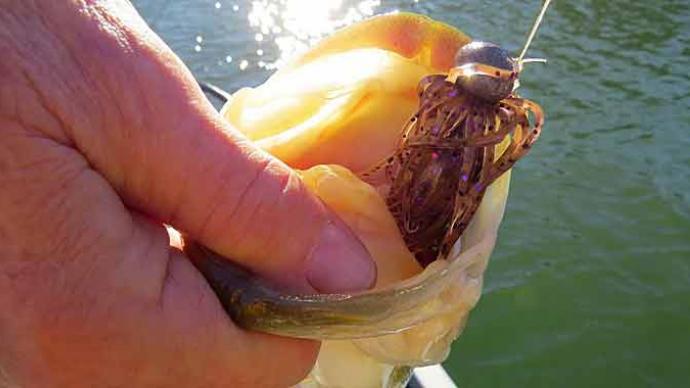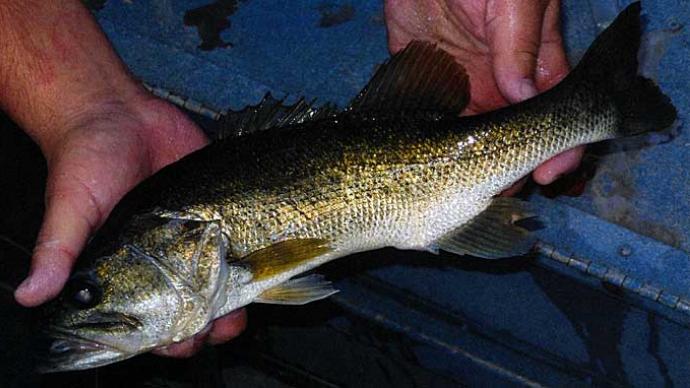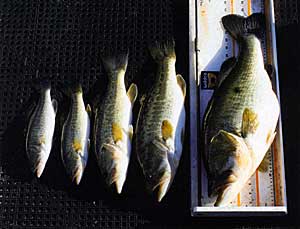
Have you ever caught a fish from your favorite fishing hole, took one look, and just gawked at how skinny it was?
Then, on the next cast, you get one that, in the words of famous B.A.S.S. founder, Ray Scott, "Looks like an Alabama deputy sheriff." No offense to our law enforcement family out there, it's just a cool visual...all that buffed up, muscle-bound bass tugging at the end of YOUR line.
What gives?
Well, that can be a complicated issue, to say the least. For example, it's easy for us to assume that a skinny bass has simply run out of food and is starving. That's the simplest, easiest to understand phenomenon. Or, maybe it's just "old" and on its last legs, so to speak.
Which reminds me of a story, 'er a lesson learned, many years ago. Seems there was a man from Houston who had recently bought a piece of property. Getting up in years a little bit, he seemed to have a sense of urgency. I'll always remember the phone call. "Son, I'm building a lake down here, west of Houston."
I countered, "Yessir."
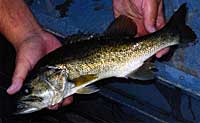
He said, "I know you fish people like to stock them finger-length fish and wait for them to grow up."
"Yessir," I countered again.
"Son, I don't even buy green bananas. I ain't sure I'll be around when they get ripe."
I chuckled out loud.
"I don't want to wait for fish to grow up," he said. "Can you handle that?"
I said, "Yessir." Then, I added my first real words, "That's gonna be pretty expensive, buying enough baitfish and large bass to fill a lake."
"Son," he said, "don't worry about the mule going blind, load the wagon!"
I knew I was going to like this guy.
As I learned what he was up to, this project became more fun. He ended up building a nine acre lake wrapped around the base of a hill. It was shaped somewhat like a sliver of a quarter moon. When it didn't rain for a month, he drilled a well. Eight weeks later, he was ready for fish.
By then, I'd already been shopping. One of my clients had several lakes where we'd been growing some pretty good fish. He also held an aquaculture license. I called him, asking if he'd part with a double-digit bass or two.
His answer was clear and decisive, "No." He'd been babying those Florida bass for seven or eight years and didn't really want to part with them.
So, I called the ripe banana-buying new client and told him the news.
His response?
"Money whip him!"
I chuckled again and called back client number two, the one with some good bass.
I asked him again. "Would you sell a double-digit bass?"
"No! I've already told you that.
"Will you take $200 for one?"
"No!"
"How about $300?"
"I'm gonna hang up on you!"
"How about $500?"
He paused. We had just established a principle, now we just needed to negotiate the price.
Client number two said, "Would he buy two of them at that price?"
I said, "Yessir, plus he'll buy some smaller bass, if you want to part with some of your extras."

We made a deal and ended up moving 450 adult bass from this little ranch/licensed fish farm back in 1987 into the new nine-acre lake west of Houston.
As we prepared to harvest bass, we needed to set the stage for those high dollar babies to have plenty to eat in their new digs.
So, in this brand-spanking new lake, we stocked 25,000 small bluegills, 10,000 medium bluegills, 500 pounds of fathead minnows, 500 pounds of golden shiners and 10,000 threadfin shad. All a lucky bass had to do was turn its head, open mouth, make a sucking sound, and fill its prime little belly with food.
We had great expectations.
When the bass arrived, we weighed and measured each fish, made copious notes, and wished them luck as we stocked them into their new home. (We didn't tag them back in the 80's like we do now—didn't realize we could).
Over time, those fat, healthy bass changed.
In year two, the biggest bass, stocked at a paltry 13 pounds 7 ounces, was gathered via electrofishing and weighed. It had skyrocketed to 12 pounds 4 ounces. The next year, we captured it again. It had ballooned to 10 pounds 2 ounces. I was shocked. My ripe banana client asked me, "What gives?" He had never hooked either one of his monster bass and had only seen this one when we initially released it.
As we reweighed and measured at this two- year mark, I saw a trend. About 20-30 percent of the bass were losing weight. Even with a pond full of all the food they could possibly inhale. About 40-50 percent maintained the same weight as when they were stocked. The rest did quite well. They grew exceptionally fast.
Over the years, I've seen this situation repeatedly. The best explanation I can give is that a bass makes a living based on two important concepts—instincts and conditioning.
When a bass is conditioned to one environment, grows into adulthood, and then is moved to another habitat or environment, it doesn't have the ability to think, reason, or adjust. It's stuck in its Pavlov's dog state of mind, and simply can't make the transition. It was heartbreaking to watch a majestic bass in its prime of life deteriorate. That fish might have surpassed 15 pounds—if we'd left it where it had learned to play its game of life.

That fish became skinny, even with all the food it could possibly eat.
What are other reasons a bass may be skinny?
Keep this in mind: In order for a bass to grow to 18 inches, it MUST weigh 3 pounds 4 ounces. It must. That means if you have an 18 inch bass which weighs less than that.. .it has lost weight.
Bass can be skinny because they don't have enough food. That's true. They can also be skinny because they are old—bass only have a given number of heartbeats. Several other factors can define their years on the earth, depending upon which part of the planet your bass live. The most important being that they actually get to live those years, as most are eaten before they are a month into life. Beyond surviving its youth, as a bass matures and reaches the end of its heartbeats, it deteriorates. As it deteriorates, it loses weight.
Another reason a bass might be skinny is because its digestive system is blocked. I've seen that several times, usually because a piece of soft plastic bait is wedged between the stomach and the intestines. Don't throw your used plastic baits overboard.
Another reason a bass might be skinny is because it has too many hungry parasites inside its gut cavity. While this isn't likely, it's certainly possible.
One final reason a bass can be skinny is because it grew up down the road in a big public lake, or someone else's pond, and was transferred into your lake and just couldn't make the change.
So, the next time you catch a skinny fish, give it a hard look and try to figure out why. You may have a fisheries problem, or you may have an individual fish with issues. Either way, try to figure it out. Go ahead and sacrifice that fish. It's okay.
After a fish loses so much weight, the odds of it regaining are slim and its growth potential is now limited.
If you can learn from it, take the opportunity.
After all, there are lots more bass coming up your pond's life cycle and what you learn now can make a difference in how you manage the rest of the group.
Reprinted with permission from Pond Boss Magazine

